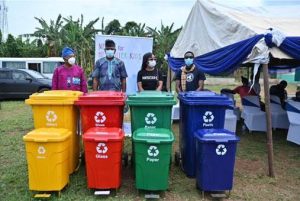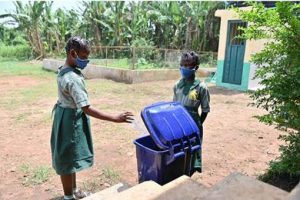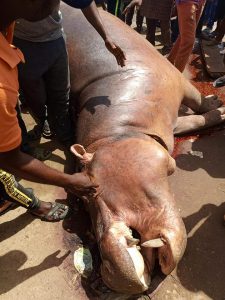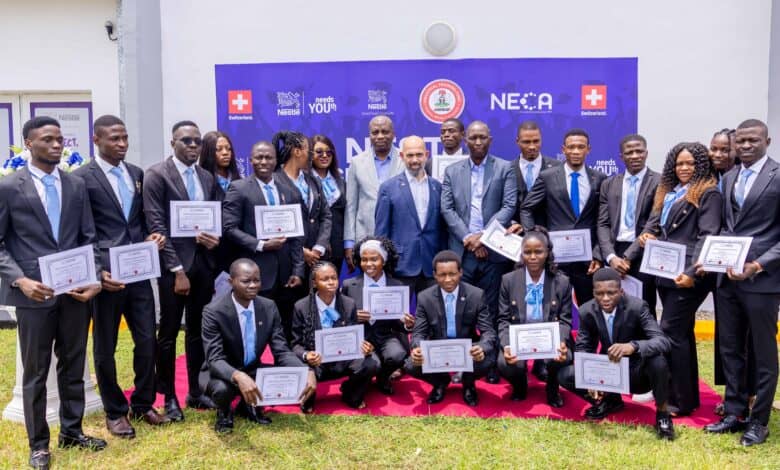Features
Nestlé: How we’re tackling climate change, promoting environmental sustainability globally

By Obinna Odogwu
The harsh impacts of climate change are affecting everyone in the world today. No one is spared: man, animals and other inhabitants of the earth.
From increase in temperature to flooding, drought to low crop yield, food shortage, reduced livestock production, loss of income, public health crisis, loss of shelter, road networks and other infrastructure, the list goes on and on.
These conditions, in various ways, have contributed to the loss of lives and biodiversity across the globe. Some of them have ignited and sustained violent conflicts in various parts of the world.
For example, armed groups including Boko Haram have reportedly been terrorising the Lake Chad Basin for many years now due to climate-related disasters such as flooding and drought which increased poverty and food insecurity in that region.
That basin covers parts of Nigeria, Niger, Chad and Cameroon. And about 11.3 million people, out of 30 in that basin, have reportedly been displaced as a result of the conflicts.
In other parts of the world, various problems caused by climate change are also raging.
To tackle these issues, world leaders on December 12, 2015, reached a historic agreement to reduce carbon emissions across the globe. They did so at the United Nations Climate Change Conference in Paris. They set a target of ending it by 2050.
That agreement, signed by 195 states, was a very important pact for international cooperation which would greatly help in tackling climate change and its negative impacts.
The main idea is to ensure that the global temperature does not increase beyond 1.5°C above pre-industrial levels.
Touched by the devastating impacts of climate change in the world, and also concerned about the future of its business, Nestlé, in 2019, signed the United Nations ‘Business Ambition for 1.5°C’ pledge.
The ‘Business Ambition’ was an urgent call to action from a global coalition of UN agencies, business and industry leaders led by the Science Based Targets initiative (SBTi) in partnership with the UN Global Compact and the We Mean Business Coalition.
It was launched in June 2019 in the lead-up to that year’s Climate Action Summit in an effort to raise the ambition on climate action and push companies to set science-based targets aligned with 1.5°C as opposed to 2°C.
To walk its talk, Nestlé in March 2023 launched its Net Zero Roadmap, aiming to end its own carbon contributions by 2050 in line with the Paris Agreement.

Nestlé Nigeria volunteers with heaps of wastes they recovered from Arena Market
The company said that it emitted 92 million tonnes of greenhouse gas in 2018, but has since started taking steps to reach carbon neutrality by or before 2050. It said the net zero roadmap was developed using the 2018 baseline.
With that roadmap in hand, Nestlé commenced actions to achieve a 20 per cent reduction in carbon emissions by 2025, 50 per cent by 2030, and net zero by 2050 at the latest.
Collection, recycling of Nescafé Dolce Gusto capsules, plastics, others
Across the world, Nestlé is setting up infrastructure and also collaborating with reputable organisations to promote the collection of the containers of its used products for recycling.
In Romania, the company is working with Kaufland Stores to expand the collection network of NESCAFÉ Dolce Gusto capsules throughout the country for recycling. Already, it has installed over 70 points.
The initiative, launched in December 2022, facilitates the recycling of used capsules and helps reduce environmental impact.

Waste management equipment donated to schools by Nestlé Nigeria
The collected capsules are taken over by Verdum, a specialist local partner, which sorts and processes them to separate coffee grounds, plastic and aluminium.
After the separation, the coffee is turned into biogas or compost, and plastic and aluminium are recycled and reintroduced into the production circuit.
Irina Siminenco, Nestlé’s Corporate Affairs Manager in the country, said that the company makes constant efforts to create new packaging designed from the ground up to be recycled, as well as in terms of developing the recycling infrastructure.

Schoolchildren depositing wastes into the basket donated by Nestlé Nigeria
“We encourage NESCAFÉ Dolce Gusto consumers to use the recycling infrastructure and return used capsules to one of the available locations”, Siminenco said.
“We are committed to making our packaging 100 per cent recyclable or reusable and reducing the use of new plastics by a third. This means using more recycled materials and creating more reusable packaging.”
The company said that Nescafé Dolce Gusto was constantly improving the design of its packaging to use less virgin plastic where possible, aiming to reduce its virgin plastic usage by one third by 2025.
It said that since 2014, it had invested more than 300 million CHF in recycling infrastructure across the world for its coffee capsule products. This, according to it, was to give value to material that might otherwise have been wasted or lost.
In Belgium, Nestlé is collaborating with other coffee brands and aluminium packaging producers to enable the recycling of its coffee capsules through the Plastic, Metal and Drinks (PMD) bluebag.
It said the initiative was kicked off in January 2023, and that similar projects had taken place in Germany, Spain and other parts of Europe.
In France, Nestlé equipped 51 recycling centres across the country with specialist machines to recycle aluminium capsules.
It revealed, in a statement, that it formed an alliance with Nespresso and JDE Peet’s in 2019 with the intention of recycling all the aluminium capsules in the country.
It said that globally, 88 per cent of Nespresso Club Members have access to a Nespresso dedicated recycling solution for capsules close to their homes.
These efforts to collect and recycle used capsules, according to the company, are also taking place in various parts of the world.
In Nigeria, Nestlé employees make efforts to protect the environment by collecting plastic wastes within their environments for recycling purposes.
Through the company’s Employee Plastics Collection Scheme launched in 2022, the staff members return all plastic materials, not limited to the company’s brands for recycling. And they get rewarded by the management for doing so.
That scheme inspires staff to protect the environment and combat plastic pollution by inculcating in them the habit of sorting wastes at source.
During every year’s World Clean-Up Day commemorated in September, Nestlé employees use the opportunity provided by the platform to promote awareness on positive waste management practices that would enhance environmental cleanliness, safety and sustainability.
Nestlé says that it is strongly committed to the protection, renewal and restoration of the environment, and as such would continue to implement key initiatives that would promote environmental sustainability.
The company, through its global employee volunteering initiative, Nestlé Cares, carries out cleanup exercises, sensitisation and advocacy outreaches on environmental sustainability every year in the country.
It does so in collaboration with the Africa Clean-Up Initiative (ACI), an NGO passionate about raising environmentally responsible citizens and communities that would always work for the good of the planet.
In 2023, the team carried out cleanup exercises in 12 markets across the country. Over 400 volunteers from Nestlé took part in that exercise.
The locations are: Abuja and Abaji in the Federal Capital Territory (FCT), Jos in Plateau State, Port Harcourt (Rivers), Awka (Anambra), Sagamu, Ota and Agbara (Ogun), Ibadan (Oyo); Enugu, Kano and Lagos States.
The exercise was powered by MAGGI, one of Nestlé’s leading brands.
Wearing disposable gloves and facemasks, the volunteers used the equipment they were provided with such as waste bags, rakes, trash grabbers and wheelbarrows to safely convey the collected garbage.
The Corporate Communications, Public Affairs, and Sustainability Lead at Nestlé Nigeria, Victoria Uwadoka, said that the company was taking concrete actions to protect, renew, and restore the environment every day.
“We are conscious that indiscriminate waste disposal coupled with limited recovery services aggravate the waste crisis,” Uwadoka stated.
The company, according to her, recognises that creating awareness through advocacy is necessary on its journey towards a waste-free future.
She said that Nestlé prioritizes post-consumption plastic waste management and that’s why it motivates behavioural changes and creates an efficient recovery system in collaboration with other industry and community stakeholders.
“We are also accelerating sustainability education through our employees, the media, our communities, and children in our Nestlé for Healthier Kids beneficiary schools”, Uwadoka adds.
The Founder/CEO of the African Clean-Up Initiative, Dr Alexander Akhigbe, said that the team ensured the proper management of over 6,660kg of solid waste and 79kg of recyclables collected across all the locations during the cleanup exercises “so that they do not end up back in the environment.”
“We are honoured to be working with Nestlé Nigeria as her implementing partners for this year’s event,” he added.
Across the locations, traders and residents commended the Nestlé Nigeria volunteers for cleaning their environment, saying that they had been motivated to start doing so going forward.
Catching them young
Still in Nigeria, Nestlé is making efforts to inculcate in schoolchildren the habit of proper waste management for healthy living.
It established a program, Sustainability Training for Kids, a platform it uses to teach and encourage them to adopt positive behavioural changes to enhance environmental sustainability.
Through this education campaign, implemented in collaboration with the International Climate Change Development Initiative (ICCDI), children develop a sustainability mindset from an early age and learn basic skills on how to care for the planet.
The children are also taught sorting of waste at the source with the donation of segregated bins to participating schools.
The trainers furnish children with information on waste management, including how to sort waste at source. They also introduce them to the conversion of waste to useful items.
It was gathered that Nestlé donated segregated bins to the participating schools.
Introduction of paper refill packs
In May this year, Nescafé introduced its first paper refill pack for Nescafé Gold Blend in the United Kingdom. This refill pack could easily be recycled through kerbside collection.
Ingrid Hayes, Marketing Director of Nescafé Soluble Coffee at Nestlé UK and Ireland, said that the innovation would reduce packaging weight by about 97 per cent compared to the traditional 200g glass coffee jars.
“Nescafé is dedicated to driving positive change and offering more sustainable choices whilst offering the same great coffee and the iconic rich aroma that people love”, Hayes said.
Available reports show that Nescafé recorded success with the introduction of recyclable in-store refill pouches in 2022, and this latest launch builds upon it.
It demonstrates the brand’s ongoing commitment to sustainable packaging and to Nestlé’s goal to reduce its use of virgin plastic by one third by 2025.
Reforestation efforts across the world
As part of efforts to check its carbon footprint, Nestlé has planted millions of trees in many countries. Through its Global Reforestation Program, it aims to plant and grow 200 million trees globally by 2030.
“Reforesting our planet will help to play a critical part in tackling climate change”, the Good food, Good life company says.
In June this year, Nestlé Nigeria employees under the global employee volunteer platform, Nestlé Cares, planted about 1,000 trees at the Nestlé Dairy Demonstration Farm in Abuja.
The tree planting, which took place in the Paikon-Kore Grazing Reserve in the Federal Capital Territory, was aimed at mitigating the harsh impacts of adverse weather conditions.
The group carried out the planting activities in collaboration with the volunteers from Convention for Business Integrity Innovations Nigeria Limited (CBiIL) to commemorate the 2024 World Environment Day.
The Corporate Communications, Public Affairs, and Sustainability Lead at Nestlé Nigeria, Victoria Uwadoka, at the tree planting event, revealed that members of staff of the company take part in the exercise annually.
“Every year, hundreds of Nestlé employees from around the country generously donate their time and talents to activities that positively impact local communities and the planet”, Uwadoka revealed.
“By planting a thousand trees today, we are collectively demonstrating our commitment to climate action, both as individuals and as one Nestlé.
“This marks the beginning of more ambitious tree-planting campaigns as we accelerate action towards improving climate change resilience within our communities”, she added.
The employees, through the Nestlé Cares launched in the country in 2019, have engaged in various projects such as beach cleanup exercises, orphanage outreaches, market cleanup activities and mentorship programs for youth; all targeted at caring for their communities and the planet.
The Nestlé volunteers explained that trees play a pivotal role as natural carbon sinks with the capacity to absorb about 20kg of carbon dioxide per annum, and as such actively contribute to carbon sequestration.
They said that planting 1,000 trees within the dairy demonstration farm would serve a dual purpose of fortifying the ecosystem resilience and also act as effective windbreakers.
The group explained that the trees would mitigate the impact of adverse weather conditions on the farm and safeguard the well-being of the animals.
Commenting on the development, the Director of Animal Husbandry Services, Federal Capital Territory Administration (FCTA), Hajia Umma Abubakar, commended Nestlé Nigeria and its partners for their commitment to climate action.
She said that the initiative aligned perfectly with the FCTA’s vision for environmental conservation, and demonstrated the power of collective action in building a sustainable future.
In Algeria, Nestlé employees and their families, in collaboration with the country’s Directorate of Forests, planted about 600 trees in Algiers’ Bouchaoui and Blida’s Chrea forests in March 2021.
The initiative was in support of the country’s reforestation drive which became very important following the devastating fires in November 2020 that reportedly destroyed around 42,000 hectares of forests.
“We are very happy to play whatever part we can in supporting Algeria’s reforestation efforts; as we constantly seek collaboration with the government and other entities to help create shared value for all”, Patrick Khoriaty, Nestlé’s General Manager in the country had said.
Available reports show that since 2010, Nestlé has achieved 60 per cent reduction in CO2 emissions at its two factories in Algeria, and 25 per cent reduction in CO2 emissions in logistics and supply chain activities across the MENA region.
It has also achieved zero waste for disposal at its food manufacturing sites and distribution centres in the country.
In Australia, Nestlé has commenced actions to plant and grow 10 million trees, working in partnership with Greening Australia, One Tree Planted and Canopy. It revealed planting more than a million trees already.
“Working in collaboration with local landholders and communities, the 10 million trees will help restore local biodiversity, improve water quality and enhance degraded soils”, Nestlé said.
“Trees will be planted in locations linked to regional areas where we source our raw materials.”
It explained that establishing a bio diverse mix of native species would support its ambition to capture approximately 1.9 million tonnes of CO2 over a 25-year carbon crediting period.
“Under this partnership, the trees will be monitored across 28 years as they reach maturity, delivering long-term environmental and economic benefits.”
Rob Cameron, Global Head of Public Affairs and ESG Engagement at Nestlé, said that the company was already working with stakeholders within its business and supply chains to meet its carbon neutrality target.
He said that the company’s progress towards sourcing 50 per cent of its key ingredients through regenerative agriculture methods by 2030 would contribute significantly to its emissions reductions, as would investing in sustainable logistics, packaging and manufacturing activities.
Cameron said that the company was working with partners throughout its supply chain, transforming their manufacturing and packaging activities to help achieve absolute reductions in greenhouse gas emissions.
“Only five per cent of our total greenhouse gases come from our own operations. In contrast, 95 per cent come from our value chain, from activities like farming or shipping”, he added.
Nestlé, in the Net Zero Roadmap, disclosed that it’s investing CHF 1.2 billion to help spark regenerative agriculture across its supply chain, as part of a total investment of CHF 3.2 billion by 2025.
It said that the investment was to accelerate “our work in manufacturing, packaging and carbon-neutral brands.”
Benjamin Ware, Global Head of Responsible Sourcing at Nestlé, announced in 2020 that the company planned to plant three million trees across the Americas starting from March of that year in partnership with One Tree Planted.
Ware said that the reforestation exercise of the company would help greatly in the fight against climate change which would benefit everyone including farmers and their communities.
“Their farms will become more efficient, more climate-friendly and more climate-resilient, just as extreme weather events are expected to become more frequent”, he added.
Features
Biodiversity: Anxiety over Nigeria’s endangered species

If urgent actions are not set in motion across towns and local government areas in Nigeria, many endangered species of plants, wild animals and important organisms may go extinct in or before the next 10 years.
This is because of the growing, and most times illegal, exploitation of their populations and other harmful human practices that deplete their numbers at a rapidly increasing rate.
At the moment, Nigeria has a total of 309 threatened species according to a red list drawn by the International Union for Conservation of Nature (IUCN) in 2013.
That list, cited in the government’s National Biodiversity Strategy and Action Plan (2016 – 2020) published by the Federal Ministry of Environment in 2015, listed their taxonomic categories as follows: mammals (26), birds (19), reptiles (8), amphibians (13), fishes (60), molluscs (1), other invertebrates (14) and plants (168).
Ever since that report was published, human actions which endanger the existence of these plants, animals and other creatures have not stopped; and it doesn’t seem that the government is taking real actions to address the menace.

The hippopotamus reportedly killed in Kogi
Although a bill proposal, which when passed would help to address the issue of illegal exploitation of wildlife, has been presented in the House of Representatives, there hasn’t really been strong enforcement activities of the previous laws and policies designed to tackle the illegal wildlife trade.
There haven’t also been serious awareness campaigns to reduce the demands for illegal bush meat in the urban and rural areas, and as well, discourage patronage of ivories and others across the country.
The bill, prepared by the Federal Ministry of Environment, is jointly sponsored by the House Committee Chairman on Environment, Hon. Johnson Oghuma, and Hon. Sam Onuigbo.
Called the Endangered Species Conservation and Protection Bill 2023, the legislative document which passed first reading in January would strengthen the country’s laws to aid the prosecution of offenders.
Oghuma said: “The rate at which some species of fauna and flora are being extinguished is assuming a frightening dimension. Every day, more and more species are becoming endangered and pushed to the brink of extinction.
“It is worthy of note that any action that is against biodiversity sustainability comes with a great cost. Just as humans have the right to life, so do the plants and animals.
“We (Nigeria) must therefore do everything within our strength to ensure their sustainability. It is time to act to stop environmental degradation and protect our wildlife and plants globally and Nigeria cannot afford to be the last.”
Speaking on the development, founder of Wild Africa Fund, an environmental conservation group, Peter Knights, described the bill as “a new state of the art legislation which would help Nigeria get away from this role of being this hub of trafficking, to really being a regional leader in encountering wildlife trafficking.”
He said that the bill, if passed, would give the authorities the legal tools to close down trafficking. He said that border agencies have made huge seizures but have struggled to prosecute and pursue criminals internationally due to weak laws previously.
But in a recent interview, Knights explained that the bill, when passed and signed into law, would help improve the current enforcement efforts, given that it was prepared by the Ministry of Environment and as such has the administration’s backing.
“Some new reforms include that it will bring Nigeria into compliance with international conventions like the United Nations with the right laws to implement them.
“It will also increase the investigative powers including financial inquiries and intelligence led operations which will really assist the Customs Service, NESREA and the police in conducting investigations.
“They will be able to use undercover techniques, look into financial records of people involved in wildlife trafficking, and this could really help to disrupt the organised crime which wildlife trafficking has become.
“It will also increase penalties to reflect the seriousness of the crime. Penalties in the past were very low. The new penalties would be a big disincentive for people who want to commit wildlife crime.
“The law will also expand the court’s ability to expedite seizure of assets used in the commission of wildlife crime. So, if people are using their vehicle to transport wildlife, they could lose that vehicle. These are very standard penalties that people have used all over the world in combating organised crime.
“Wildlife crime is very organised and often involves foreign nationals, not just Nigerians, so the new law will increase the ability to have international cooperation and even extradition.
“It will also address habitat destruction, permit violations and invasive species which is another threat to biodiversity as invasive species that come from another continent, perhaps, dislodge local wildlife. So, it will be an offence to conspire or to perpetrate such illegal acts.
“It really clarifies definitions, the roles of key agencies that were not clear in the legislation and their powers”, he said.
Knights said that the new legislation also provides mechanisms to strengthen the current enforcement of the existing laws and policies.
“For example, it enables Customs Service to do undercover investigations. There are a number of provisions in this bill, which would make it easier for the enforcement agencies because the penalties have increased.
“Obviously, they don’t want to spend a lot of resources and time if at the end of the day, it’s a very minor penalty, this doesn’t make any sense. But now with the ability to seize assets, law enforcement agencies have been incentivised. It elevates wildlife crime into a significant crime.
“There are new techniques like undercover investigations, ability to extradite and pursue criminals from other countries, which makes this bill effective in fighting wildlife crime”, he said.
But until that bill passes through the legislative rigours and gets presidential assent, the illegal exploitation of wildlife which is rapidly driving many of them into extinction will continue.

Kogi residents taking selfie on the body of one of the slain hippos
Interestingly, Nigeria has an abundance of plant and animal species which make it very rich in biodiversity. This is due to the country’s complex topography, favourable climate and a wide range of habitats.
These include the rainforests of the Cross River basin, the coastal creeks of the Niger Delta, the mountains along the Cameroun border and the marine and freshwater ecosystem across the country among others.
In addition to that, there is the existence of an inland layout of an array of other forest ecosystems including the Sahel Savannah in the extreme north, Sudan Savannah, Guinea Savannah and Derived Savannah woodland.
Statistically, Nigeria has an endemic flora of 91 species belonging to 44 families with rubiaceae accounting for the highest numbers.
But with the rate of human exploitation of these already endangered species, they may just all be gone in no distant time if the menace is not urgently checked.
Already, the ugly results are beginning to show. Scientists reported that only about 50 lions were still around in Nigeria. Reports also indicate that the population of pangolin is rapidly decreasing due to the illegal trade in its scales.
According to WildAid, Nigeria has emerged as the top transit point in the world for illegal ivory and pangolin scales trafficked from Africa to Asia. It said that between 2016 and 2019, over half of the pangolin scales seized globally came from Nigeria.
In February 2020, Wildlife Justice Commission (WJC) published a report that showed a significant and rapid increase in the volume of pangolin scales being trafficked, revealing that it was facilitated by transnational criminal networks that are driving the species to extinction.
The commission reports that between 2016 and 2019, an estimated 206.4 tonnes of pangolin scales were confiscated from 52 seizures. It believes that the rate is only a fraction of the total being trafficked, as it is likely that a significant proportion of smuggling passes undetected.
“Six of the 27 identified countries and territories disproportionately involved in the trafficking of pangolin scales were found to be linked to 94 per cent (193.2 tonnes) of all seized contraband during the period analysed in this report, with Nigeria and Vietnam playing prominent roles in the supply chain.
“Between 2016 and 2019, they were linked to almost 70 percent of pangolin scale seizures (143.6 tonnes). During 2018-2019, this prevalence even increased as 84 per cent of all detected shipments involved one or both countries.
“The Nigeria – (Singapore) – Vietnam smuggling route has also been identified as a significant transportation route for the smuggling of scales on their own or in combination with ivory”, Wildlife Justice Commission reported.
WJC believes that it’s an organised crime considering the coordination and infrastructure required to facilitate the harvesting, processing, storage and transportation of the reported volume of pangolin scales which appear very huge.
“In order to effectively dismantle the criminal networks behind it and bring the high-level traffickers to justice, the trafficking of pangolin scales must be tackled from a truly intelligence-led approach, identifying the chronic crime enablers combined with the use of advanced investigative techniques applied to other organised crimes, such as controlled deliveries”, it added.
While there was an outcry to save the remaining pangolins and lions in Nigeria, some other animals have gone extinct in the country.
A report by WildAid shows that Nigeria has no surviving cheetahs, rhinos or giraffes and fewer than 50 lions, 100 gorillas, 500 elephants and 2,300 chimpanzees are left in the wild.
“Despite the ongoing conservation efforts, poaching for body parts and meat along with habitat loss from deforestation, infrastructure development, and agricultural expansion threaten wildlife in Nigeria.
“Illegal bush meat consumption is widespread across Nigeria’s top cities”, it says.
A survey carried out by GlobeScan revealed that 70 per cent of the respondents said that they had consumed bush meat at some point in their lives.
The survey, commissioned by WildAid which was published in January 2021, showed that there was a growing appetite for bush meat among urban residents.
“This consumption also overlaps with the illegal trade networks, fuelling the trade in protected species like elephants and pangolins.
“While studies have shown that bush meat consumption in Nigeria is influenced by a number of factors such as taste, health and culture, there is a little information on the attitudes, awareness, preferences and reservations of the general public in major cities such as Lagos, Abuja, Port Harcourt, and Calabar”, the survey report reads.
Despite the risk of zoonotic diseases’ transmission, 75 per cent of the 2,000 respondents sampled within the months of September and October 2020 disclosed their intentions to eat bush meat in the future.
“Results found that over 70 per cent of urban Nigerians have consumed bush meat at some points in their lives, and 45 per cent consumed it within the last year.
“Taste and flavour are significant factors influencing urban bush meat consumption, with about 51 percent of bush meat consumers indicating that it is one of the primary reasons for their choice,” the report partly reads.
By now, it is possible that the population of Nigerians, especially those living in the urban centres who relish bush meat, might have increased. And beyond taste and flavour, hunger and high cost of fish and beef might have also influenced their choices.
The Federal Government has said that it was making spirited efforts to stop illegal wildlife trade and all harmful practices that threaten the nation’s biodiversity, saying that it was interested in ensuring that its citizens live in harmony with nature.
The government said that it was for that reason that it floated the National Biodiversity Strategy and Action Plans (NBSAP) and has been using it to work towards stamping out illegal wildlife trade and the protection of the country’s biodiversity.
“Nigeria considers the five goals of the Global Strategic Plan for Biodiversity 2011-2020 very appropriate and applicable to its situation and adopted them to form the basis of the current NBSAP.
“It has also adopted 14 SMART National Targets with 21 Impact Indicators and 67 Actions with 123 Performance Indicators and 20 Programmes.
“Consequently, Nigeria’s current NBSAP is closely aligned to both the Convention on Biological Diversity (CBD) Strategic Plan for biodiversity 2011-2020 and its Aichi Biodiversity Targets and Nigeria’s unique priorities and features”, the government says in its NBSAP report.

One of the three hippopotami reportedly killed in Kogi
But despite these efforts, illegal killing of wild animals has continued to take place across the country. In the urban centres, restaurants and entertainment centres where bush meats are sold continue to boom.
For example, in Kogi State, about three hippopotami were killed in 2022 according to reports. The last one was killed in that confluence state in November that year at the Ganaja axis of the Rivers Niger/Benue.
It’s been about two years after the locals killed the hippopotami but till date, there has not been any report of any action taken by the Kogi State Government to protect the already endangered wild animals.
In fact, one of the hippopotami that were killed in that state was said to have been shot dead by some local vigilantes in the area. The villagers reportedly shared the meat among themselves.
In Taraba State, the story is not so different. About 14 hunters, in March 2022, reportedly killed a hippopotamus at the Kwoi River, close to Bajimba village, in the Gassol Local Government Area of the state and shared the meat among themselves.
That action prompted the state government to declare them wanted. As of the time of filing this report, it was not clear if any of the hunters had been apprehended and if the government was still interested in the matter.
Commissioner for Environment in the state, Alhaji Lawan Ibrahim, had blamed the Gashaka/Gumti National Park located in the state for the death of the hippopotamus, saying that the wild animal would still have been alive if the park officials had responded quickly to a call on them to rescue it.
In an interview published by Punch, the commissioner said: “The hippopotamus belongs to the category of wild animals. You know that they survive and move in riverine areas.
“So, when the water in the area dried off, it left the hippopotamus vulnerable and when we heard about it, we drafted some of our personnel there who went and brought back the report.
“We immediately wrote a letter to the Gashaka/Gumti National Park located in the state, notifying it of the presence of a hippopotamus disturbing people around the area and destroying their crops.
“People in that area do dry season farming, so we wrote to the national park to come and handle the situation.
“The national park equally wrote to their head office, but before they got a reply, the people in the area, who are into dry season farming, ran out of patience because of the level of destruction of their crops by the hippopotamus.
“Before we knew it, we were informed that the hippopotamus had been killed. That is why the state government ordered the killers’ arrest”, Ibrahim said.
Asked why the state government wrote to the national park instead of handling the situation immediately, the commissioner said: “We wanted to liaise with the national park because our principal, the Governor, was outside the country.
“You know how the civil service operates – the bureaucracy would have taken some time and we wanted to act fast.”
But contrary to the commissioner’s account, the villagers denied killing the wild animal. They claimed that hunters from Mayo-Renewo, Binnari and Shagarda communities in the Ardo-Kola, Karim Lamido and Gassol LGAs of the state did.
A resident in the area who gave his name as Musa Maikudi told newsmen that “the hunters secretly mobilised themselves in the night and went to the river where the hippopotamus was staying and killed it.
“They dragged the body to the forest far away from the river and shared the meat. The report of the killing of the hippopotamus was, however, leaked by a rival group that was not involved in the killing of the animal.
“The state government has ordered the arrest of the hunters involved and all the hunters are now on the run.”
Sometime in August 2015, soldiers reportedly killed a ‘notorious’ hippopotamus in a dam in Gombe State. The slain hippo had been accused of terrorising Yamaltu/Deba LGAs of the state.
The animal was alleged to have killed some fishermen and farmers near the Dadin/Kowa dam before it was shot dead by soldiers on a Wednesday, according to local officials.
The state authorities had said that the ‘notorious’ hippo had “killed many people in the last two years.”
The Head of Forestry, Yamaltu/Deba LGA, Ismail Umar, confirmed the killing of the wild animal, saying that the state officials were aware of the threats posed by the hippopotamus since 2013, and had complained to the LGA about the damages it had caused; adding that permission to hunt it down was sought.
“We were lucky to trap it outside. We used military men. And with the help of the local hunters, we shot it yesterday night around 10:30pm when it came out to eat grasses, and today we butchered it into pieces”, Umar had told newsmen; adding, however, that there were about 100 hippos in the dam.
The permanent secretary of the state Ministry of Environment and Forest Resources, Adamu Pukuma, said that the hippo that was killed was “notorious” in the area. He said that the state was committed to protecting hippos to ensure they do not go extinct.
“It killed people around the area as well as destroyed people’s farms and fishing equipment, and there were complaints from the people. That was why we sought the governor’s approval and killed it,” Pukuma was quoted as saying.
In Anambra State, ivories and other wild animal parts are being sold in some of the major markets in the state just as it is the case in other states. And they are expensive too. An elephant tusk in Eke Awka Market is sold at N150,000 while other animal parts have different price tags.
A community leader in Awka, the state capital, Mr Paulson Okeke, lamented that the country no longer has wildlife. He said that Nigerians have driven the wildlife he used to see as a child into extinction.
“The truth is that we don’t still have wildlife in this country because human activities have put them into what I could call endangered species.
“Take for instance, there are parts of the north where elephants were common before; but today you cannot see them again.
“We used to hear about Yankari Games Reserve in Bauchi. We grew up there. We used to go to Bauchi Games Reserve to look at animals. We watched lions, tigers, elephants and others; just in their natural habitat. But today you cannot see all those things again.
“In Plateau State, there is this national park in Jos; when you go there, you see wildlife; they’re in quantum but today they’re no longer there.
“Down there in Enugu, there is Enugu Zoological Garden, the Enugu Zoo. During our childhood days, we used to go to the zoo to watch all these animals. Enugu Zoo today has been converted into a housing estate and sold to big men.
“And such is the danger posed to wildlife in this country. I must tell you honestly that we don’t have wildlife in this country again. Those that are remaining are going into extinction.
“This is because some businessmen are poaching them, selling them; killing them and selling their skins. Some eat them. So, that is the problem”, he lamented.
Okeke, however, revealed that his people of Awka community protect monkeys. He said that their cultural practices prohibit the killing of monkeys in the town.
“Here in Awka, my town, the wildlife that is common here which we protect is monkeys. The monkey is protected but the activities of strangers have put them into dangers.
“The reason is this. Inasmuch as Awka people are protecting and keeping them, those who are not from Awka are killing and eating them. So, it becomes what is good for you may not be good for me.
“If it is good for you to keep it, it is good for me to eat it. So, these are part of it”, Okeke said.

Alonta
A lecturer in the Department of Technology and Vocational Education, Nnamdi Azikiwe University, Awka, Gabriel Alonta, told the reporter that he was worried about the onslaught on wild animals in the country and, indeed, harmful practices driving some plant species into extinction.
“I don’t eat bush meat. I have heard about restaurants where bush meats are being sold in Anambra but I have not visited any. I have not visited any because I am not a fan of it”, he said.
Alonta said that although the country may have laws prohibiting illegal killing of wild animals, his countrymen have no record of obeying such laws and were not likely going to do so.
“Are Nigerians really going to abide by any rule that the government has promulgated? I ask because Nigerians should first start by showing love to their fellow humans first. They need to start being humans themselves before they can extend such love to animals.
“Why I am saying this is because Nigerians may find it difficult to follow any rule in that regard. I am aware that there are international efforts geared towards the protection of the environment, animals and the rest of them.
“There may be rules against illegal killing of wildlife but the question is ‘are there enough monitoring agencies to monitor the implementation of such?’
“I remember that in Nnamdi Azikiwe University, Awka, for instance, there is a zoo. The university established it to preserve wild animals. I don’t know how effectively the place is being managed but I know it exists.
“The situation is worrisome but a common Nigerian would tell you that they need to feed and survive first before talking about protecting animals. I think that it boils down to systemic failure that we have in the country,” Alonta submitted.
Features
How Nestlé is breaking chains of poverty, empowering youths in Nigeria

By Obinna Odogwu
Nigeria, at the moment, is grappling with the challenge of youth unemployment. This challenge, in some ways, is stalling its various development efforts.
Recently, the National Bureau of Statistics (NBS) revealed that the country’s youth unemployment rate rose to 8.4 per cent in the first quarter of this year from 6.9 per cent where it stood in the first quarter of 2023; a 1.5 per cent increment.
It further revealed that the country’s general unemployment rate increased to 5.3 per cent in the first quarter of this year compared to the 4.1 per cent in the first quarter of last year.
The last National Youth Survey published by the Federal Ministry of Youth and Sports in collaboration with the NBS in 2020 shows that the population of Nigerians 35 years and below is 74.22 per cent of the entire population estimated to be about 209.6 million in 2021.
When broken down, about 28.76 per cent of the total population is below the age of 15 and 45.46 per cent are between the ages of 15 – 35.
The Nigerian Economic Summit Group (NESG), in a report published in September this year, said that the country’s misery index – the sum of unemployment and inflation rates – rose to 36.9 per cent in the first quarter of 2024 from 30.5 per cent in the third quarter of 2023.
This means that many Nigerians are experiencing a cost of living crisis and weak purchasing power due to rising inflation, with many being pushed into poverty.
NESG lamented that pervasive unemployment among the youth cohorts could be responsible for the high rate of Not in Education, Employment or Training (NEET), which stood at 14.4 per cent in 2024Q1 compared with 13.7 per cent in 2023Q3.
Many public affairs analysts and scholars have identified poverty and lack of economic opportunities as the major factors driving many young people into criminality.
They say that there is a clear causal link between poverty and insecurity ravaging various parts of the country.
This situation is worsened by the poor economic condition of the country which has made life difficult for many people; even more difficult for the unemployed youth.
It was, perhaps, for this reason that NESG made it clear that there was an urgent need to empower the youth with productive skills and jobs.
“This could reduce youth restiveness and minimise social unrest in the country”, the group says.
Although the federal and sub-national governments are making efforts to stem the tide of the growing youth unemployment through various programs, these efforts appear like a drop in the ocean given their increasing population.
Enter Nestlé Nigeria
Worried by this ugly trend, Nestlé Nigeria joined in the efforts to create economic opportunities for the young people by undertaking their training and eventual employment with the company.
Part of the idea is to mould future leaders who would not only ensure their personal sustenance but also help their communities thrive. And beyond that, their fresh ideas, diverse perspectives and energy would also, in turn, benefit the company.
Establishment of Nestlé Technical Training Centre (TTC)
In 2011, Nestlé established a technical training program where young people are trained and equipped for future leadership in the business world.
It is a multi-skill engineering program which offers a rigorous 18-month curriculum designed to combine theoretical learning with hands-on engineering experience.
The training program culminates in participants receiving the highly regarded City and Guilds of London Technicians’ Certification, a qualification that significantly enhances their employability in Nigeria’s evolving industrial landscape.
It was gathered that the content of the course was based on the syllabus of the City and Guilds of London technicians’ examinations certificates in engineering, one of the leading vocational education organisations in the world.
It was further gathered that Nestlé, the Nigerian and Swiss governments have an agreement where the top five graduating trainees from each batch undergo an additional three months internship in Switzerland, practicing their trade in the company’s factories.
This TTC program started at the company’s Agbara Factory in 2011 and later on was extended to the Abaji factory.
A total of 137 trainees have graduated from the Agbara centre so far. And out of that figure, 130 of them have been employed by Nestlé while seven were employed by some other firms.
The Abaji factory training centre, active for about three years now, has graduated 52 trainees out of about 72 it admitted. While Nestlé employed 51, the remaining one was employed by another firm.
In February 2023, the company established the TTC model in its Flowergate factory in Sagamu, Ogun State, following its successes in Agbara and Abaji factories.
The Flowergate centre started its training with 20 pioneer students who have since graduated. They have also been absorbed by the company.
So far, about 209 young Nigerians have been empowered by the company through the technical training program which it started 13 years ago.
Nestlé Nigeria’s investment in youth development has been substantial, costing valuable time and resources. The company disclosed that it had committed over N6 billion so far to ensure the success of the training initiative.
Speaking at the graduation ceremony at Flowergate, Mr. Wassim Elhusseini, Managing Director and CEO of Nestlé Nigeria, reiterated the company’s long-standing commitment to nurturing talents in the country. He also expressed pride in the graduates.
“For over 13 years, our commitment to developing young talent has reflected our confidence in the potential of this generation,” Mr. Elhusseini stated.
“This year alone, we proudly graduated 70 skilled professionals across all of our training centres, including those at Agbara and Abaji, who have all now joined our team.
“For us, this program is about more than just imparting technical skills, it’s about empowering young people to shape their futures and become agents of change in their communities.
“By equipping them with the technical expertise they need, we’re not just opening doors to personal and financial growth, but also making a long-term investment in Nigeria’s future.”
The Flowergate event was significant as it served as a testament to the company’s ongoing efforts to equip Nigerian youth with vital technical expertise needed in today’s world.
Prominent figures, including His Royal Majesty, Oba Babatunde Adewale Ajayi, the Akarigbo and Paramount Ruler of Remo Land, who attended the graduation ceremony praised the initiative for its impact on local communities.
The Nestlé needs YOUth Initiative
Beyond the technical skills program, Nestlé Nigeria, through the company’s global initiative, Nestlé Needs YOUth, exposes young Nigerians to various economic opportunities by offering them avenues to build their skills and access employment opportunities.
Each year, the initiative reaches about 25,000 young people and prepares them to succeed in a rapidly changing industrial environment.
The initiative, through its three strong pillars, helps young people access various economic opportunities. The pillars are: Employment and Employability, Agripreneurship and Entrepreneurship.
Employability and employment was the first pillar launched in 2013, and was intended to enhance the job prospects of young people amid the worsening global financial crisis.
Through it, Nestlé helps young people access economic opportunities by offering jobs, traineeships, internships (including its Nesternship program), apprenticeships and training.
The company says that through these programs, young people can gain the skills and experiences required to secure a job and thrive in their position.
In 2023, a total of 10,807 young people were offered apprenticeship and traineeship opportunities across Nestlé. In 2022 and 2021, the figures were 11,495 and 11,598 respectively.
Under entrepreneurship, the company empowers young innovators to learn new skills, test ideas or grow their own businesses – to help shape the future of food.
The company says that a total of 72,630 young entrepreneurs have received some basic but tangible benefit from it globally.
Under agripreneurship, Nestlé inspires “farmers of tomorrow” by making farming look more attractive to young people.
The company encourages them to run their farms as business and to embed regenerative agriculture methods in support of a just transition to regenerative food systems.
Through the Nestlé Agripreneurship Program, a total of 8,464 young farmers were trained in 2023 and 5,121 in 2022.
The company says that globally, it has given a total of 7,720,000 young people access to economic opportunities since 2017.
It adds that 4,100,140 youths have been impacted through digital events that focus on up-skilling them and making them more employable, through career fairs, educational webinars and e-learning programs from 2021 to 2023.
The company says that its ambition is to help 10 million young people around the world access economic opportunities by 2030 through employment and employability, agripreneurship and entrepreneurship.
Nestlé Nigeria’s boss, Elhusseini, said that by equipping the youths through these initiatives, the company creates shared value.
He said that Nestlé’s long-term investment in the future of Nigerian youth was creating ripples of progress that would be felt for generations to come.
Rallying global business community to support the youth
At the global level, Nestlé, through the Global Alliance for YOUth Initiative, is working with other organisations to help millions of young people around the world find a job, thrive in the workplace or start a business.
The alliance of 25 like-minded companies, which it leads, provides training, nurtures young entrepreneurs and offers first job opportunities.
The group says that its goal is to provide opportunities and a platform for young people.
“Since early 2019, collectively, our member companies have offered more than 30 million development opportunities for the youth around the globe”, it says.
“Together, we learn from each other, leverage our networks, build-on successes and help young people navigate the rapidly and ever changing work environment.”
Nestlé needs YOUth, launched in 2013, has become a global phenomenon – a movement that has united, empowered and enabled over five million young people around the world since inception.
Local alliance for the youth
At home, Nestlé joined a business-driven movement, Alliance for Youth, to empower young Nigerians with the skills they need to thrive in today’s business world.
The Alliance, of which Nestlé Nigeria is a founding member, includes organisations such as Big Bottling Company, the United Nations Global Compact Network Nigeria, Jobberman Nigeria and U-Connect HR Limited.
The group operates with support from the Federal Ministry of Youth, Lagos State Employment Trust Fund, and Activate Success International, with the aim to reach 250,000 young Nigerians with employability and entrepreneurial skills.
The vocational skills training, a flagship initiative, covers four key skill areas, namely: CCTV and cable installation, solar panel installation, graphic design (including social media and web design), and beauty care, including makeup, aromatherapy, and massage.
This training is delivered in collaboration with the Whitefield Foundation,
The graduation of 372 young people who participated in various vocational training programs of the group was the highpoint of the 2024 International Youth Day celebration.
Participants who performed excellently well from each skill set were rewarded with start-up kits and capital to enable them start their own businesses.
Those who took part in the beauty, massage and aromatherapy training received makeup tool kits and massage beds; those from the graphic design training received laptops; while those from the solar installation class were given toolboxes.
Nestlé Nigeria’s Country Human Resources Manager, Shakiru Lawal, while speaking on the initiative, said that investing in today’s youth was crucial because the actions being taken today would shape the nation’s future prosperity.
“At Nestlé, we understand that the well-being of our communities depends on the opportunities we create for the next generation”, he said.
“This is why we are committed to working with like-minded organisations to ensure that young people are equipped with the skills necessary to secure meaningful employment or start their own businesses.
“The 372 beneficiaries of this year’s training have now joined the 805 youth we had previously trained in technical and vocational skills.”
The Chief Operating Officer of the United Nations Global Compact Network Nigeria, Tumi Onamade, during the 3rd Anniversary of the Alliance for Youth, described the youths as transformational agents who could change the world with their bold and innovative ideas.
“The dedication, creativity, and resilience they have shown, especially those who travelled from various states to participate in the vocational skills training held in Ogun State, highlight their commitment to personal growth and community development.
“These young individuals are not just the leaders of tomorrow; they are the change-makers of today, shaping a more sustainable and inclusive future with their innovative ideas and bold actions.
“At the United Nations Global Compact Network Nigeria, we are committed to supporting the Alliance and our youth by providing them with the skills to realise their potential. By investing in their education, skills development, and leadership, we empower them to create a future where everyone can thrive”, Onamade said.
Collaborating with the National Youth Service Corps (NYSC), career fairs and such other goal-oriented organisations, the group has provided 35,499 youth with vocational training, employability, and soft skill enhancements.
Testimonies from TTC participants
Cross sections of the TTC participants have commended Nestlé Nigeria for the opportunity they were given to develop their technical skills.
Ezekiel Bibire, One of the graduates, said that the 18-month training exercise was tough but quite enriching.
“The journey was not easy, but through it all, we have achieved this milestone and are delighted for the knowledge imparted,” he stated.
Another alumnus, Moshood Kilaso, said that he was satisfied with the training program, saying that it was rich in content. He encouraged the graduates from the program to maintain resilience in their duties and strive to be the best.
Nestlé’s harvest of recognition, awards
A golden fish has no hiding place. So the saying goes. For its contribution to national development, Nestlé Nigeria has been recognised, commended and awarded by reputable organisations in the country for supporting the country’s development through youth employment and others.
In November 2023, the company was awarded at the prestigious Employers Excellence Awards organised by the Nigeria Employers Consultative Association (NECA) in Lagos for its exceptional performance across various business metrics including people practices, sustainability, diversity and inclusion.
At the annual awards, Nestlé Nigeria carted home some awards, namely: Best Employer in Food and Beverage, Investment in Sustainability and Green Initiatives, Exemplary Investment in Diversity and Inclusion, and was also recognised for efforts towards the elimination of child labour in the workplace.
In the same November, the company was awarded by the Industrial Training Fund (ITF) as the Best Contributing Employer in Training Activities for 2022 within the Isolo Area Office jurisdiction.
On the 16 of the same month, it was, again, presented with the HR Best Practice Awards by HR OSCARS for the FMCG sector.
Nestlé Nigeria, a leading player in the food and beverage industry, has earned so many other awards and recognition too numerous to mention. And at the global level, the story is the same.
-

 News8 months ago
News8 months agoI’ll be president for all, Nwofe assures Igbo community in Yorkshire
-

 Politics9 months ago
Politics9 months agoWe’ll represent you well, Awka North councillors assure constituents
-

 News9 months ago
News9 months agoUK: Igbo community in Yorkshire elects new leaders
-

 News7 months ago
News7 months agoAPGA mourns as deputy chairman buries father in Anambra
-

 Sports10 months ago
Sports10 months agoEPL: Guardiola welcomes ex-Man Utd manager to Manchester City
-

 Politics9 months ago
Politics9 months agoAwka North’ll witness massive development under my watch –Anago
-

 Business6 months ago
Business6 months agoMultichoice announces new price hike for DStv, GOtv packages
-

 Business9 months ago
Business9 months agoIPMAN, Dangote reach agreement on direct lifting of petroleum products
